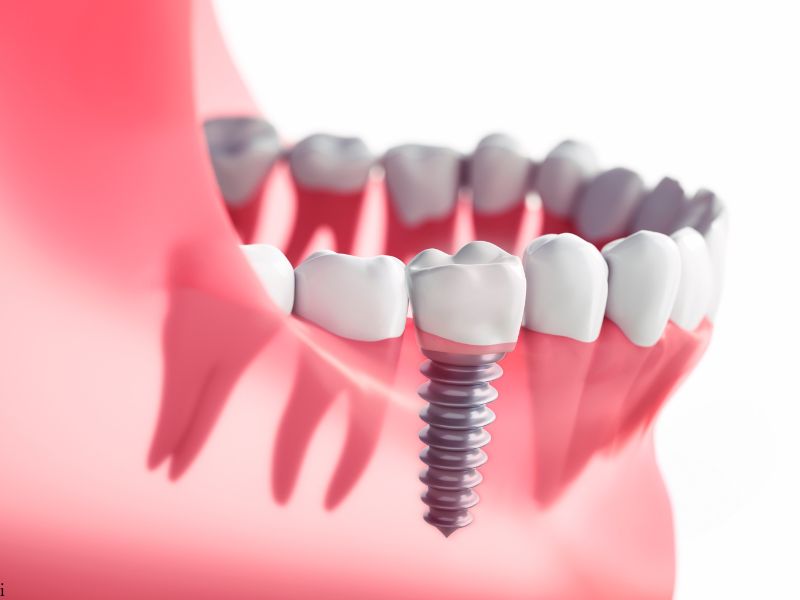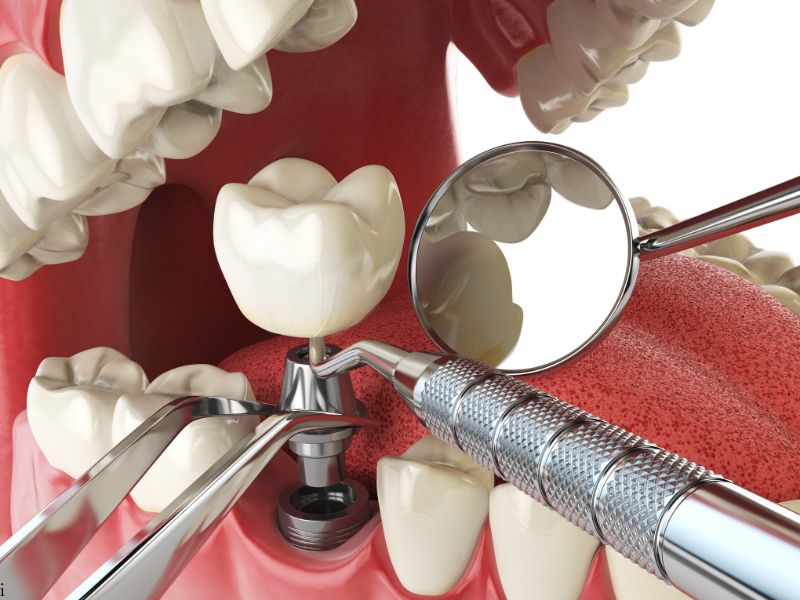Whether you’re exploring this option for functional or cosmetic reasons, understanding the process, benefits, risks, and aftercare is essential.
What Are Dental Implants?
Dental implants are advanced systems that replace missing teeth by mimicking the natural tooth structure. Each implant consists of three primary components:
-
Implant Body: Surgically placed in the jawbone, it acts as a replacement for the tooth’s root.
-
Abutment: A connector that attaches to the implant body and extends through the gumline to support the artificial tooth.
-
Artificial Tooth: A crown, bridge, or denture mounted on the abutment to restore function and appearance.
By integrating seamlessly with the jawbone, dental implants provide stability and help prevent bone loss—a common issue after tooth loss.

Why Consider Dental Implants?
Losing a tooth due to injury or disease can lead to a range of issues, such as bone loss, changes in chewing patterns, speech difficulties, and aesthetic concerns. Dental implants not only address these problems but also offer long-term benefits for oral health.
Benefits of Dental Implants:
-
Restores Chewing Ability: Dental implants function like natural teeth, allowing you to eat comfortably.
-
Improves Appearance: They enhance your smile by filling gaps caused by missing teeth.
-
Prevents Bone Loss: Implants stimulate the jawbone, preventing shrinkage and preserving its structure.
-
Maintains Adjacent Teeth: Unlike bridges, implants do not rely on neighboring teeth for support, keeping them stable.
-
Boosts Quality of Life: From speaking clearly to enjoying your favorite foods, dental implants improve overall confidence and well-being.
Are You a Candidate for Dental Implants?
While dental implants are a viable option for many, certain factors influence candidacy. Before opting for this procedure, it’s important to discuss your overall health and lifestyle with your dental provider.
Things to Consider:
-
General Health: Conditions like uncontrolled diabetes or compromised immune systems can affect healing and implant success.
-
Smoking: Smoking may slow the healing process and increase the risk of implant failure.
-
Bone Density: Adequate jawbone structure is necessary to support the implant body.
-
Healing Time: It may take several months for the implant body to integrate with the bone fully, during which a temporary abutment is often used.
Always ask your dentist about the brand and model of the implant system being used, and keep this information for future reference.

What to Expect After Dental Implant Surgery
Dental implant surgery involves a healing phase that is critical to the success of the implant. Proper care and regular checkups are essential during this time.
Post-Surgery Tips:
-
Follow Oral Hygiene Instructions: Cleaning the implant and surrounding teeth is crucial to prevent infections and ensure long-term success.
-
Attend Regular Dental Checkups: Routine visits allow your dentist to monitor the implant and surrounding tissue.
-
Report Issues Promptly: If the implant feels loose or causes discomfort, inform your dentist immediately.
With proper care, dental implants can last for decades, offering a durable and reliable solution to missing teeth.
Potential Risks
While dental implants are generally safe and successful, complications can occasionally occur. These may arise shortly after the procedure or years later.
Possible Risks:
-
Surgical Complications: These include injury to surrounding tissues, sinus perforation, or jawbone fractures during implant placement.
-
Implant Failure: Caused by local or systemic infections, delayed healing (common in smokers), or poor oral hygiene.
-
Nerve Damage: Can result in post-surgical numbness or tingling in the jaw, lips, or tongue.
-
Difficulty Cleaning: Implants require meticulous cleaning to prevent gum disease and infection.
If complications arise, such as an implant becoming loose or causing pain, additional surgical procedures may be necessary to correct or replace the implant.
Safety of Dental Implants
Dental implant systems are made from biocompatible materials like titanium or zirconium oxide, ensuring they integrate well with the body. These materials meet stringent safety standards set by organizations such as the International Organization for Standardization (ISO) and ASTM International.
Manufacturers must demonstrate that their dental implant systems are as safe and effective as those already on the market before receiving FDA approval. Biocompatibility testing ensures that the materials used do not cause irritation, allergic reactions, or other adverse effects when implanted.
How to Handle Problems with Dental Implants

If you experience issues with your dental implant, such as discomfort, looseness, or signs of infection, it’s important to address them promptly. Reporting these problems to your dental provider and, if necessary, filing a report through the FDA’s MedWatch program can help identify potential risks and improve patient outcomes.
When reporting an issue, include the following details if possible:
-
Date of implantation.
-
Brand and model of the implant system.
-
Description of the problem and any follow-up treatments.
-
Relevant medical and dental history.
Conclusion
Dental implants have revolutionized the field of dentistry, offering a permanent and effective solution to tooth loss. By restoring the ability to chew, improving cosmetic appearance, and preserving jawbone health, implants significantly enhance the quality of life for patients.
With proper care, dental implants are a long-term investment in your oral health and confidence. If you’re considering dental implants, consult your dental provider to explore your options and start your journey toward a healthier, brighter smile.
